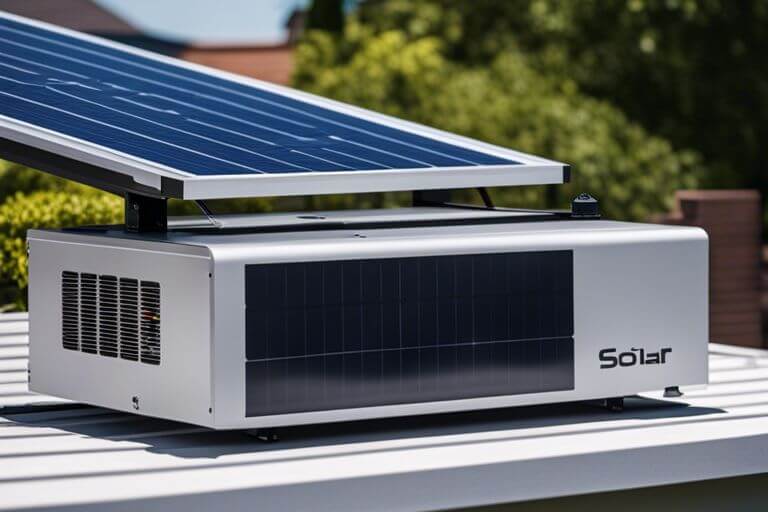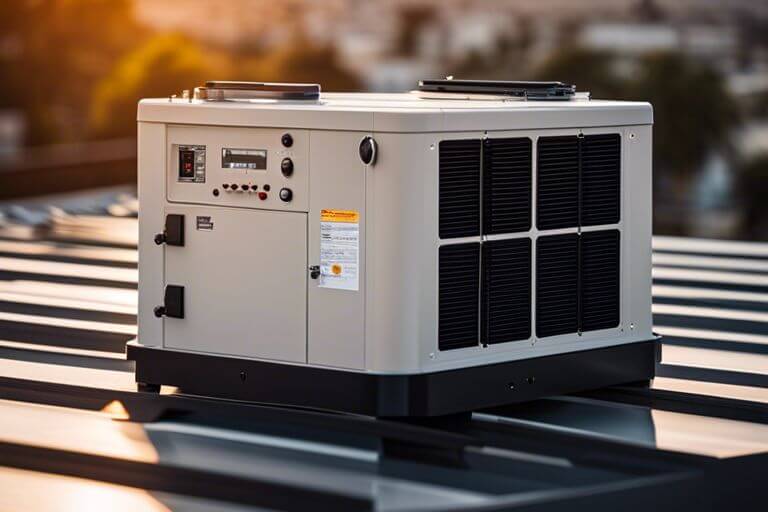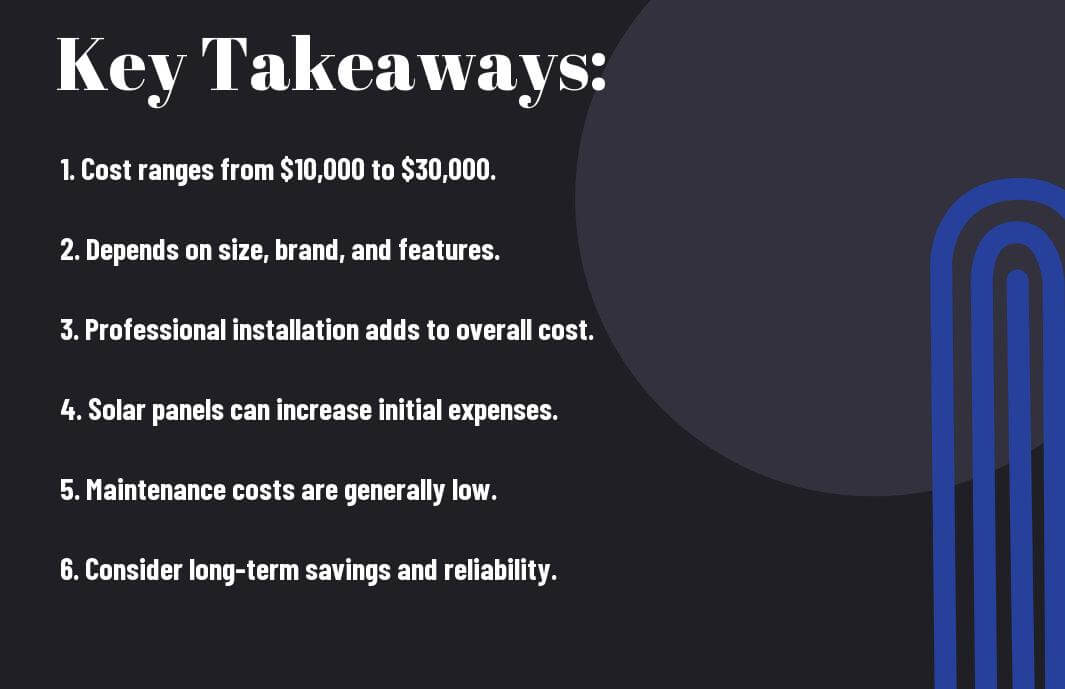Many homeowners often wonder about the cost of a solar whole house generator. When considering this alternative power solution, you may be curious about the financial investment it requires. In this article, we will break down the factors that determine the cost of a solar whole house generator, helping you make an informed decision for your home’s energy needs.

Key Takeaways:
- Cost can vary: The price of a solar whole house generator can vary depending on factors such as size, brand, and installation requirements.
- Initial investment: While the upfront cost of a solar whole house generator may be higher than traditional generators, it can provide long-term savings on energy bills.
- Return on investment: Despite the initial cost, a solar whole house generator can offer a great return on investment by providing reliable and sustainable power during outages.
What is a Solar Whole House Generator?
Before plunging into the costs associated with a solar whole house generator, it’s imperative to understand what exactly it is. A solar whole house generator is a system that uses solar power to generate electricity for your entire home. It is designed to provide a reliable source of backup power in case of outages or emergencies, ensuring that your household can continue to function normally even when the grid is down.
Definition and Functionality
What sets a solar whole house generator apart from traditional generators is its reliance on solar energy. By harnessing the power of the sun, these generators can store energy in batteries for later use, making them a sustainable and eco-friendly option for backup power. The system is typically installed on the exterior of your home and is connected to your electrical panel to automatically kick in when needed.
Benefits of Solar Whole House Generators
Generators powered by solar energy offer several benefits that make them an attractive option for homeowners looking to invest in backup power solutions. One of the main advantages is their ability to provide a constant source of electricity without the need for fuel. This not only saves you money in the long run but also reduces your carbon footprint, contributing to a greener environment.
For instance, during prolonged power outages, a solar whole house generator can keep your imperative appliances running, such as refrigerators, heaters, and medical devices. This constant power source can offer peace of mind knowing that your household’s basic needs are taken care of, regardless of external circumstances.

Factors Affecting the Cost of a Solar Whole House Generator
Some key factors influence the cost of a solar whole house generator. Understanding these factors can help you make an informed decision when considering a purchase. Factors that affect the cost include the system size and capacity, the type and quality of equipment, as well as installation costs and labor.
System Size and Capacity
Solar whole house generators come in various sizes and capacities, depending on the energy needs of your household. The larger the system size and capacity, the higher the cost is likely to be. It’s crucial to assess your energy requirements accurately to determine the right size for your home. Oversizing can increase costs unnecessarily, while undersizing may not provide adequate power during outages.
Type and Quality of Equipment
Factors such as the quality of solar panels, inverters, batteries, and other components affect the overall cost of a solar whole house generator. High-quality equipment generally comes with a higher price tag, but it can offer better efficiency, durability, and performance over time. Cheaper equipment may save you money initially, but it could lead to higher maintenance costs or a shorter lifespan in the long run. It’s crucial to strike a balance between upfront costs and long-term benefits when choosing the equipment for your system.
Installation Costs and Labor
Factors like installation complexity, labor costs, and any necessary modifications to your home’s electrical system can impact the total cost of a solar whole house generator installation. Hiring experienced professionals for the installation is crucial to ensure the system functions optimally and safely. The intricacy of the installation process, such as roof mounting or electrical wiring, can also influence the overall cost. Ensuring a proper installation is key to maximizing the efficiency and longevity of your solar generator.
Average Costs of Solar Whole House Generators
Small Systems (1-5 kW)
Your average cost for a small solar whole house generator, ranging from 1-5 kW, can vary depending on factors like brand, features, and installation. The initial investment for a small system typically falls between $5,000 to $15,000. Keep in mind that smaller systems may not be able to power your entire house during an outage, so it’s important to assess your energy needs before making a decision.
Medium Systems (5-10 kW)
The cost of a medium-sized solar whole house generator, ranging from 5-10 kW, can range from $15,000 to $30,000. These systems offer more power capacity and can handle larger loads compared to smaller systems. When considering a medium system, you should factor in the installation costs, maintenance expenses, and any additional features you may require to meet your energy needs.
Generators in the 5-10 kW range are suitable for average-sized homes with moderate energy consumption. They can power important appliances like refrigerators, lights, and heating systems during a blackout, providing you with the peace of mind that your household will remain functional in emergencies.
Large Systems (10-20 kW)
Average costs for large solar whole house generators, ranging from 10-20 kW, can start from $30,000 and go up to $50,000 or more. These systems are designed to power larger homes with high energy demands or for homeowners looking to have backup power for extended periods. The higher price point reflects the increased power output and capability of these generators.
For instance, a 10-20 kW solar whole house generator can support multiple appliances simultaneously, including air conditioning units, sump pumps, and electronics. If you have a larger home or specific energy requirements, investing in a larger system might be the ideal choice to ensure reliable backup power during outages.
Cost Breakdown of a Solar Whole House Generator
Despite the initial investment, a solar whole house generator can provide you with long-term savings and peace of mind. Let’s break down the costs involved in setting up a solar whole house generator to give you a clear picture of what to expect.
Solar Panels
One of the primary components of a solar whole house generator is the solar panels. These panels are responsible for capturing sunlight and converting it into usable electricity for your home. The cost of solar panels can vary depending on the quality, brand, and efficiency. On average, you can expect to pay between $10,000 to $20,000 for a system that can power a whole house.
Inverter and Charge Controller
An crucial part of a solar power system, the inverter and charge controller, help manage the electricity generated by the solar panels. An inverter converts the direct current (DC) electricity produced by the panels into alternating current (AC) electricity used in your home, while the charge controller regulates the flow of electricity to the batteries. These components can cost you around $2,000 to $5,000, depending on the system’s size and capacity.
With proper installation and maintenance, the inverter and charge controller can significantly impact the efficiency and longevity of your solar whole house generator system.
Battery Bank and Accessories
Battery storage is crucial for a solar whole house generator to store excess electricity generated during the day for use at night or during power outages. A battery bank and accessories, such as wiring, fuses, and connectors, will cost you an additional $5,000 to $10,000, depending on the size and capacity needed to meet your household’s energy demands.
Battery backup ensures that you have a reliable source of power even when the sun goes down or during prolonged cloudy days.
Installation and Labor Costs
Labor costs for installing a solar whole house generator can add up to around $3,000 to $6,000, depending on the complexity of the installation and the time required to set up the system properly. It’s crucial to hire experienced professionals for the installation to ensure the system functions efficiently and safely.
Whole house generator installation involves mounting the solar panels, connecting the components, and configuring the system to meet your specific energy needs and preferences for seamless and reliable power generation.
Incentives and Rebates for Solar Whole House Generators
Keep in mind that when you invest in a solar whole house generator, you may be eligible for various incentives and rebates that can help offset the initial cost. These financial benefits can make switching to solar power even more cost-effective for you.
Federal Tax Credits
Households that install a solar whole house generator can take advantage of the federal Investment Tax Credit (ITC). This credit allows you to deduct a significant percentage of the cost of the system from your federal taxes. Currently, the ITC covers 26% of the total system cost, making it a substantial incentive for investing in solar energy.
State and Local Incentives
An additional way to save on the cost of a solar whole house generator is by exploring state and local incentives. Many states offer their own tax credits, rebates, or performance-based incentives for installing solar power systems. These incentives can vary widely depending on where you live, so be sure to research what options are available in your area to maximize your savings.
Local governments may also provide incentives such as property tax exemptions or sales tax waivers for solar energy systems. These incentives can further reduce the overall cost of your solar whole house generator and make it a more attractive option for powering your home.
Utility Company Rebates
Utility companies sometimes offer rebates for customers who install solar whole house generators on their properties. These rebates can come in the form of cash incentives or credits on your utility bills. By taking advantage of these rebates, you can not only save money on the initial cost of the system but also reduce your long-term energy expenses.
Understanding the various incentives and rebates available for solar whole house generators is crucial in making an informed decision about your investment. By leveraging these financial benefits, you can make the switch to solar power in a more affordable and cost-effective way.
Maintenance and Operating Costs of Solar Whole House Generators
Once again, as a solar whole house generator owner, you need to consider the maintenance and operating costs involved to ensure optimal performance and longevity of your system.
Scheduled Maintenance Tasks
Generators require regular scheduled maintenance tasks to keep them running smoothly. This can include items such as checking and replacing the oil, filters, spark plugs, and ensuring all connections are secure. By staying on top of these tasks, you can prevent major issues from arising and extend the life of your solar whole house generator.
Replacement Parts and Upgrades
House solar whole generators may need replacement parts or upgrades over time to keep them running efficiently. This could include replacing the battery, inverter, or other components that may wear out or become outdated. Investing in high-quality replacement parts and upgrades is crucial to maintain the performance of your generator.
Replacement parts and upgrades for solar whole house generators are available from various manufacturers and suppliers. It is crucial to choose the right parts compatible with your system to ensure seamless integration and optimal performance.
Energy Efficiency and Performance Monitoring
Operating your solar whole house generator efficiently is key to controlling your energy costs. Monitoring its performance and energy efficiency can help you identify any issues or areas for improvement. By tracking your generator’s performance regularly, you can make adjustments as needed to optimize its efficiency and save on operating costs.
For tasks such as energy efficiency and performance monitoring, you can leverage monitoring software or tools provided by the generator manufacturer. These tools can give you valuable insights into your system’s performance and help you make informed decisions to enhance its efficiency.
By staying on top of scheduled maintenance tasks, investing in quality replacement parts and upgrades, and monitoring your generator’s energy efficiency and performance, you can ensure that your solar whole house generator operates effectively and efficiently for years to come.

Final Words
To wrap up, investing in a solar whole house generator can be a wise decision to ensure power stability and reduce dependency on the grid during emergencies. The initial cost may seem high, but in the long run, it can provide peace of mind and potentially save you money on utility bills. Consider the size of your home, power needs, and budget when deciding if a solar whole house generator is the right choice for you.
Q: How much does a solar whole house generator cost?
A: The cost of a solar whole house generator can vary depending on factors such as the size of the generator, brand, installation costs, and additional features. On average, you can expect to pay between $5,000 to $20,000 for a solar whole house generator.
Q: What factors can impact the cost of a solar whole house generator?
A: Several factors can influence the cost of a solar whole house generator, including the size and power capacity of the generator, brand reputation, installation costs, additional features such as automatic transfer switches or monitoring systems, and any necessary permits or maintenance fees.
Q: Are there any additional costs associated with installing a solar whole house generator?
A: In addition to the initial cost of the generator, you may also need to budget for installation costs, which can range from a few hundred to a few thousand dollars depending on the complexity of the installation. You may also incur additional costs for permits, maintenance, and any required upgrades to your electrical system.
